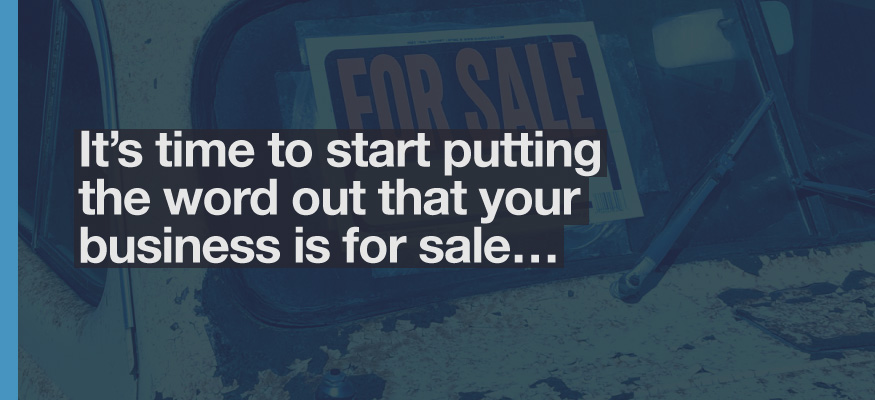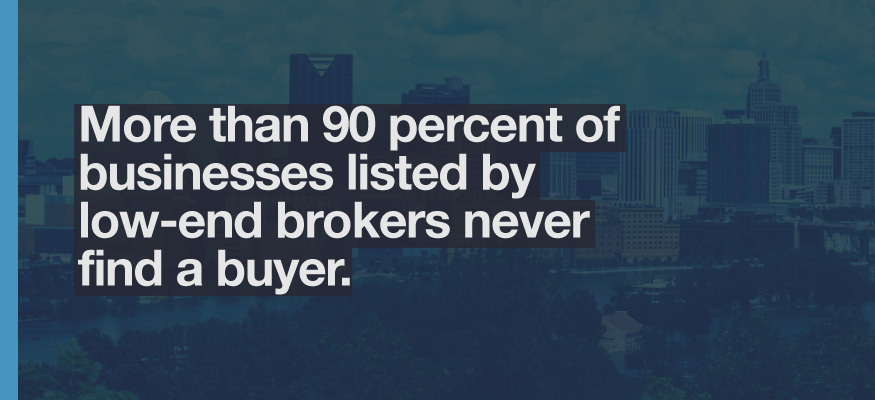For many business owners looking to sell their company, one of the first things they’ll do is contact a business broker.
This is often the best way to sell a small business, but it is not the only option. There are some cases where it may be preferable to sell a business privately.
Business brokers are equivalent to real estate agents in many respects. They sell properties for their clients and get a percentage of the sale price. Brokers will usually handle the marketing and paperwork of the sale, but those percentage fees can add up. Some small business brokers are known to charge as much as 10 percent of the total sale price.
Besides avoiding percentage fees, there are actually a number of reasons that someone may want to avoid using a brokerage when selling their business.
For example, if you’re selling your company to a friend or family member, then a broker serves no purpose. If your company has a number of liabilities and you’re embarking on what is known as a “distressed sale” to help pay back the debt, a broker is just another cost you need to pay. If you’ve ever been called a “control freak,” then you may find yourself at odds with a broker anyway.
Despite what many people will tell you, selling your company without a broker isn’t actually that difficult. In many ways, it can help the process along.
So, if you’ve ever wondered, “how do I sell my small business without a broker?” then read on. We’ve got some tips to get you started.
Avoid Delays

Time kills all deals. If you’re able to collect all of your financial data, tax returns, and other information ahead of time, you’ll be ahead of the game whether you have a broker or not.
Prospective buyers can be demanding when it comes to requesting information – and why shouldn’t they be? They’re looking at potentially spending a lot of money.
A broker would never put a company on the market until all of this information is ready and, as the seller, neither should you.
Look at it from the buyer’s perspective. What information would you need to analyze a business? Most buyers are looking for three to five years of financial records. These include profit and loss statements, balance sheets, accounting statements, and any other information you can think of.
[Note: Detailed documents like bank statements should wait until the due diligence period, once a deal is agreed upon but before it is finalized.]
Set Your Price
Even if it’s not a number you want to advertise widely at first, you should have an idea of how much you want to charge for your business. We actually built this business valuation calculator that you can use for free to find out how much your business is worth.
There are many different ways to calculate the value of a company, and each of them will give you a different number. Decide how you want to price your company–how much you’re willing to accept, and how much you want to advertise.
Brokers will not take the time to get to know your business in the same way that you know it. That means they often won’t be able to pitch it or sell it as well. After all, nobody knows the qualities of a business like the person who built it from the ground up.
While the actual number that you’ll list as an asking price is largely dependent on what you think the company is worth, it’s a good idea to have a concrete number in mind.
There are three ways to go about evaluating the value of your business.
- Ask your accountant to give you a rough idea
- Hire a professional valuer
- Do the research yourself
Of course, doing the research yourself is the cheapest option. And if you’re the type of person who says, “How do I sell my business privately?” you’re also likely the type of person who isn’t afraid of a little research.
Research by looking at similar businesses for sale in your region. Collect the numbers and add them to a spreadsheet. Create a shortlist of businesses that are similar to yours – not just the same industry, but that have similar profit and turnover to yours and are roughly the same size.
After a while, you’ll have collected enough data to give you some idea of the type of prices that other companies are asking. These numbers may be three-times their annual profit or 10-times their annual profit. It depends on the market. But collecting this data yourself will give you a solid understanding of what people are willing to pay in your area based on current market conditions.
Market Your Business

Once you’ve compiled all the pertinent financial information, it’s time to start putting the word out that your business is for sale.
Begin by connecting to your professional network and letting them know that, if anyone is interested in buying, then you’re interested in selling. Also, make sure to advertise on business sale websites like BizBuySell.com.
Some of these sites will ask for listing fees from the business owners posting the advertisements, while others don’t. Make sure to do your research.
Generally, if someone sees the ad for your business, they will sign an NDA and fill out various other forms to send to the business owner indicating their interest.
If you’re using your professional network, talk to your attorneys and accountants. Ask them if they know of any potential buyers. CPAs and lawyers often work on business deals and have a lot of connections.
Deal With The Buyer
Finding interested buyers is actually not that difficult. But it’s important to manage their expectations once they’ve shown their interest.
Make sure the buyer is qualified by asking for a personal financial statement. This ensures you’re not wasting your time or the buyer’s time in the event that there is no way they could buy your company anyway. In the event that the listing website doesn’t require this, make sure they sign a non-disclosure agreement (NDA).
If you have a prospective buyer and all of their information looks good, make sure to keep the process moving along. Don’t delay, or the buyer may lose interest. Set up meetings, offer to provide information, and continue negotiating with an eye toward closing the sale.
In many ways, this is the most difficult part of selling a company without a broker. A broker would allow the business owner to continue running their business unaffected during the long months it takes to close a deal.
One piece of information you should never divulge is any information about your customers. A generic sales report is one thing, but if the report includes the names of your customers it may invite undue attention on the people you do business with.
In certain nefarious instances, buyers may even reach out to your customers directly as they form their own business, rather than buying yours.
This is why you need to be discrete and careful with the information you provide until the buyer has signed a contract agreeing to purchase the company.
Accountants and Attorneys
“Taxes” and “lawyers” aren’t usually words that people are excited to consider. But if you’re considering selling your life’s work, they are critical considerations.
After all, you don’t want to make a mistake and create a deal that will end up costing you more money than you make on the sale.
Take taxes, for example. The amount that you’ll need to pay in taxes will depend on the type of sale you’re conducting. If you’re getting one big lump sum, the taxes you pay will be higher than if the deal was a seller-finances transaction. Hiring an accountant can help you navigate the process and make sure you know everything you need to before the sale is finalized.
Hiring a good attorney to handle the sales agreements and contracts will also go a long way. It ensures that all of the paperwork is handled properly and each party is protected.
Usually, brokers will have lawyers and accountants that they trust or are on their payroll to do these tasks. But if you decided the best way to sell your business is privately, then you’ll have to assemble your own team.
Thankfully, accountants and lawyers usually have fixed fees for these kinds of tasks. Even if they do charge by the hour, it won’t take a lot of time to calculate your tax rates or create a solid legal document.
The only way it could cost more money than you expected is if the attorney actually did the negotiating for you but that’s easy enough to handle yourself. Just make sure to communicate clearly with the lawyer about your expectations for the transaction. After that, they’ll draw up all the necessary documents.
Conclusion

According to UK Business Brokers, more than 90 percent of businesses listed by low-end brokers never find a buyer. Selling your business yourself can actually result in finding more buyers, which creates more competition, and that drives the price higher.
Brokers know how to sell a business, but they may not be the right fit for every business owner. You know your company, you’ve built it, you’ve hired the people that run it, and it’s up to you to make sure it passes to a worthy buyer.
Sometimes, a broker is more interested in their percentage than in your legacy so it falls to you to make sure your company will be well-cared for.
By doing market research to set your price, doing your own marketing, dealing with the buyer yourself, and hiring your own attorneys and accountants, you can be sure to remain in control of the process. It will help you avoid delays and you can define the conditions of the deal as you see fit.
Of course, the fault of any failure during the process also lies squarely on your shoulders. But you’ve already built your own business and decided to sell it, what are a few more responsibilities?
Are you planning to sell your business? Let Acquira help you so you can remove the frustration from the process and complete a smooth sale that protects your team, company, and culture and keeps your businesses operating for years to come. It all starts with a free valuation below.
Acquira will buy it for fair market value if your business qualifies for our program. Then you can retire. Sleep easy knowing your people are taken care of, and your legacy will live on. Find out how much your business is worth to begin the conversation.
Acquira specializes in seamless business succession and acquisition. We guide entrepreneurs in acquiring businesses and investing in their growth and success. Our focus is on creating a lasting, positive impact for owners, employees, and the community through each transition.



